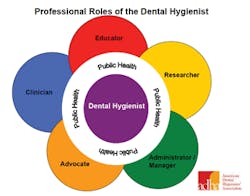Public health remains a part of dental hygiene career paths
by CHRISTINE NATHE, RDH, MS
Although many dental hygienists work in private practice, an increasing number of additional career settings have also attracted their skills. What is interesting about these present day opportunities is that public health is embedded throughout many of these career options. Remember public health, in general, focuses on the health of the population as a whole and is concerned with the health care of all. The goal of public health is to protect and promote health and prevent disease. These clearly are inherent to the science and practice of dental hygiene.
The American Dental Hygienists' Association has discussed the career options for dental hygienists, defining the roles that are embedded in public health. The first role focuses on a clinician path that includes opportunities in private offices, community clinics, hospitals, university clinics, prisons, schools, and nursing homes. A clearly defined path in public health would include opportunities as public health officers, clinic administrators, or working in a variety of local, state, or federal programs.
A dental hygienist interested in research may find employment opportunities in corporations, government research agencies, or universities. Additionally, opportunities exist in the corporate areas of sales, education, and administration. Many dental hygienists choose to teach in clinical or classroom settings, and some may decide to pursue administrative roles in academia.
I remember being surprised when I read some of the agenda items for the Connecticut Dental Hygienists' Association annual meetings during the early years of the profession. The meetings included panel presentations and topics that increased awareness on integrating dental hygiene employment opportunities in a variety of settings in Connecticut. It made me realize what it must have been like in the early 1900s, deciding to pursue an education, when most citizens had no idea about dental hygiene science or practice! They were trying to ensure job placement, which, of course, as we realize today, results in positioning dental hygiene in settings that will increase access to preventive dental care for the masses.
These career paths discussed above, whether they focus on clinicians, researchers, or educators, still involve the entrepreneurial spirit. These roles that are typical of today's dental hygienists were inherent to the roles of the founding dental hygienists. Today's entrepreneurs may start their own employment services, consulting business, or become a professional continuing education speaker or writer. In the early years, entrepreneurs started programs in schools, hospitals, universities, and private offices in Connecticut. When you look at where we began and how far we have come, one realizes that we have really only just begun to spread dental hygiene to the masses!
For more information on career paths, visit www.adha.org/professional-roles. RDH
CHRISTINE NATHE, RDH, MS, is a professor and graduate program director at the University of New Mexico, Division of Dental Hygiene, in Albuquerque, N.M. She is also the author of “Dental Public Health Research” (www.pearsonhighered.com/educator), which is in its third edition with Pearson. She can be reached at [email protected]. edu or (505) 272-8147
Past RDH Issues


